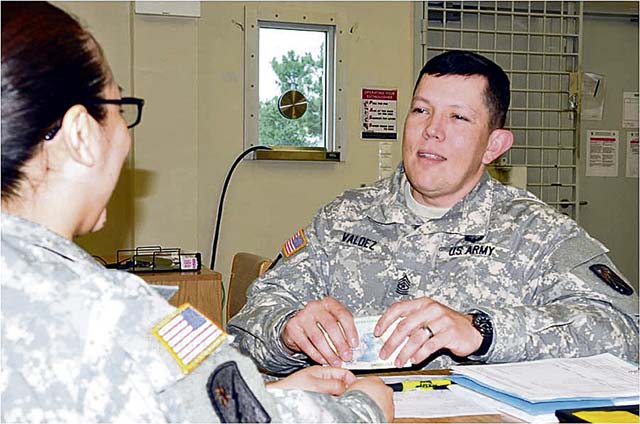
MIHAIL KOGALNICEANU AIR BASE, Romania — If a penny saved is a penny earned, a team of fiscally sound Soldiers from the 21st Theater Sustainment Command’s 16th Sustainment Brigade deliver daily dividends to dozens of MK denizens.
The Soldiers belong to the 106th Financial Management Support Unit, a unique organization headquartered in Baumholder and comprised of three company-sized detachments scattered across the 21st TSC’s expansive central European footprint.
Capt. Matt Garvin, 16th Special Troops Battalion operations officer and finance specialist who only recently rotated out of command, played a key role in the organizational effort. The Harrisburg, Pa., native identified key functions of follow-on finance forces.
Those financial forces arrived in early February as part of “Sustainment Task Force 16” and promptly occupied a caged office area formerly employed as an arms room. The team’s five personnel provide full-spectrum financial service support to military members of all services and components, especially Marines, who represent an outsized share of MK military personnel due to their dynamic regional training and partnership role.
Second Lt. Rachel Kim, dispersing agent with the 106th permanently stationed in Vicenza, Italy, said the financial forces facilitate casual pay, pay inquires, check-cashing and currency exchange. The New York City native described casual pay as the most popular service and among the most beneficial. Military personnel serving in an operational environment can take allotments of up to $200 per month in casual pay, which differs from bank, commercial or automatic teller withdrawals in that “it’s done through the military payment system rather than your financial institution,” she said.
Casual pay and other transactions accomplished through military financial services offer personnel and even their vendors — most notably Army and Air Force Exchange Service and Morale, Welfare and Recreation — inherent advantages.
“Providing financial services on post is more secure not only for the service members but for AAFES and vendors as well,” she said. “It mitigates a lot of security risks — identity theft, loss of money, losing your card, etc.”
One innovative program minimizes the physical cash flow on bases and further mitigates financial risk. The Eagle cash card program, sponsored by the Department of Defense and operated by the Federal Reserve Bank in Boston, provides deployed personnel a convenient means of conducting routine financial transactions without carrying large amounts of money or disclosing personal account information. The card functions like a conventional debit card, expediting purchases through such base vendors as the local AAFES and MWR facilities without recourse to private banking or credit institutions.
“The Eagle cash card eliminates all interface with the banks — there’s no financial information transmitted when the Soldier uses the card,” Garvin said. “So, it virtually eliminates the risk of identity theft or financial fraud.”
Financial forces plan to unveil the program and establish vending kiosks locally in mid-to-late March, Kim said.
“It’s a very secure means of making payments without using cash,” she said. “It’s linked directly to your account, so there are no transaction fees; any vendor that accepts it allows you to make payments immediately and conveniently.”
Spc. Kevin Joslyn, a pay analyst with the 106th, noted the program already pays dividends in developed theaters like Afghanistan and Kuwait. The Operation Iraqi Freedom veteran helped administer the program during his rotation.
“It was very effective for minimizing cash on the battlefield,” Joslyn said. “It was especially handy at the smaller bases where you didn’t have access to an ATM. Keeping cash off the battlefield is very important; it’s easy to lose and it can wind up in the hands of the enemy. The lesser the cash flow, the lesser the chance it will wind up in the hands of the enemy and even fund weapons that attack Americans.”
The finance team’s broader goal, Kim said, “is to maximize security, comfort and convenience for the service members. We want to provide anything that makes it easier to supply that extra level of support to everyone, whether transiting personnel or permanent party.”
Their efforts ideally make military personnel better custodians not only of their own money but government resources as well, Kim said.
“The bottom line is that you don’t want to unnecessarily subject taxpayer funds to potential fraud,” she said.
As awareness of the availability of financial services reached the barracks, service members serving at MK moved swiftly to leverage the resource.
“We’ve processed about 150 casual pays and close to $20,000,” Kim said. “We’ve processed around 50 pay inquiries in the last 11 days. I can only expect it will increase as the Soldiers become more familiar with it.”
“After they realized we were here it started to get crazy,” Bazan added with a smile. “We have a point of contact with every branch, and they all started coming in.”
Soldiers, Sailors, Airmen and Marines all appeared in the arms-room-turned-financial-nexus, the latter in numbers commensurate with their larger enduring population.
“It was hard for some of the Marines to get to the ATM, so we’ve been seeing them the most,” Bazan said.
The versatility and resourcefulness of the financial services team highlight the innovative spirit that yielded high returns from the new MK Passenger Transit Center to the life support facilities on the other side of the compound. The finance officers, analysts, agents and specialists serving in key operational as well as technical roles across Sustainment Task Force 16 ensure transiting and relatively “permanent” personnel alike remain both mission-ready and fiscally sound.
“You’re always looking for ways to improve your foxhole, to improve efficiency and improve the quality of life for the personnel you’re supporting,” Garvin said. “We identified some gaps and some places we could make a difference. As a fellow finance professional, it was rewarding to witness the impact our capabilities had on the operation. I think we’ve done everything well to facilitate mission success as well as help improve quality-of-life for our personnel.”


